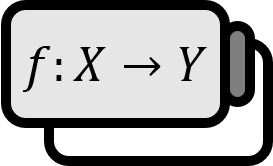Differentiation of Polynomial Functions
Formula
The derivative of a polynomial function is as follows.
$$ \dfrac{d x^{n}}{dx} = n x^{n-1} $$
- If $n \in \mathbb{N}$, it holds in $x \in \mathbb{R}$.
- If $n \in \mathbb{Z}$, it holds in $x \ne 0$.
- If $n \in \mathbb{R}$, it holds in $x \gt 0$.
Proof
$n \in \mathbb{N}$
By the definition of the derivative,
$$ \dfrac{d x^{n}}{dx} = \lim_{h \to 0} \dfrac{(x+h)^{n} - x^{n}}{h} $$
$$ (x + h)^{n} = x^{n} + _{n}\!C_{1} x^{n-1} h + _{n}\!C_2 x^{n-2} h^{2} + \cdots + h^{n} $$
By the binomial theorem,
$$ \begin{align*} \dfrac{d x^{n}}{dx} &= \lim_{h \to 0} \dfrac{(x^{n} + _{n}\!C_{1} x^{n-1} h + _{n}\!C_2 x^{n-2} h^{2} + \cdots + h^{n}) - x^{n}}{h} \\ &= \lim_{h \to 0} \dfrac{_{n}\!C_{1} x^{n-1} h + _{n}\!C_2 x^{n-2} h^{2} + \cdots + h^{n}}{h} \\ &= \lim_{h \to 0} \left( _{n}\!C_{1} x^{n-1} + _{n}\!C_2 x^{n-2} h + \cdots + h^{n-1} \right) \\ &= _{n}\!C_{1} x^{n-1} \\ &= n x^{n-1} \end{align*} $$
■
$n \in \mathbb{Z}$
Let $x \ne 0$. In the case $n \in \mathbb{N}$, since $x^{-n} = \dfrac{1}{x^{n}}$,
$$ \dfrac{d x^{-n}}{dx} = \dfrac{d}{dx} \left( \dfrac{1}{x^{n}} \right) $$
Properties of differentiable functions:
If $g$ is differentiable then $\frac{1}{g}$ is also differentiable, and the following holds.
$$ \dfrac{d}{dx} \left( \dfrac{1}{g} \right) = -\dfrac{g^{\prime}}{g^{2}} $$
From the above property we obtain:
$$ \begin{align*} \dfrac{d x^{-n}}{dx} = \dfrac{d}{dx} \left( \dfrac{1}{x^{n}} \right) &= -\dfrac{n x^{n-1}}{x^{2n}} \\ &= -\dfrac{n}{x^{n+1}} \\ &= -n x^{-n-1} \end{align*} $$
■
$n \in \mathbb{R}$
Differentiation rule for the exponential function:
$$ \dfrac{d \left( e^{f(x)} \right)}{dx} = f^{\prime}(x)e^{f(x)} $$
Differentiation rule for the logarithmic function:
$$ \dfrac{d \ln x}{dx} = \dfrac{1}{x} $$
Let $x \gt 0$. In the case $n \in \mathbb{R}$, $x^{n} = e^{n \ln x}$, and by the differentiation rules for the exponential and logarithmic functions the following holds.
$$ \begin{align*} \dfrac{d x^{n}}{dx} &= \dfrac{d}{dx} \left( e^{n \ln x} \right) \\[1em] &= \dfrac{d \left(n \ln x \right)}{dx} e^{n \ln x} \\[1em] &= \dfrac{n}{x} e^{n \ln x} \\[1em] &= \dfrac{n}{x} x^{n} \\ &= n x^{n-1} \end{align*} $$
■
